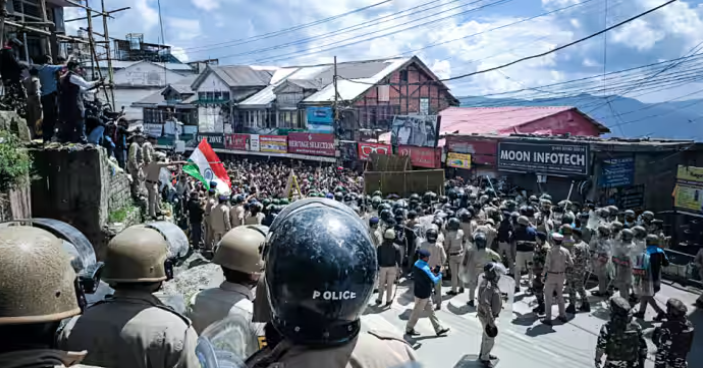Shimla Sanjauli Mosque Dispute (GS Paper 2, Society)

Introduction:
- Shimla, a picturesque hill station in Himachal Pradesh, has recently been at the center of a heated dispute over a mosque in the Sanjauli area.
- This issue, marked by protests, clashes with police, and political friction, underscores broader national themes concerning religious sites, legality, and secularism.
Details of the Dispute:
The Mosque and Its Controversy:
- The controversy revolves around a five-story mosque in Sanjauli, which some local Hindu organizations allege was constructed without proper legal authorization.
- Initially, the mosque was a single-floor structure, but it has reportedly expanded into a five-story building.
- Critics claim this expansion was done illegally and threatens the local demographic balance.
- Protesters argue that the construction violates local zoning laws and has not received the necessary permissions.
Ownership and Legal Issues:
- The Shimla Municipal Corporation has raised concerns that the mosque may have been built on government land.
- They allege that the Waqf Board, which manages Islamic religious properties, has not provided adequate proof of ownership.
- The Waqf Board counters by asserting that the land belongs to them and that the construction complied with applicable regulations.
- The local municipal court is scrutinizing these claims and has scheduled further hearings to address the legality of the expansion.
Recent Developments:
Protests and Clashes:
- On September 11, 2024, tensions escalated dramatically.
- Protesters, many of whom were local residents, clashed with police forces after breaking through barricades.
- The demonstrators, waving Indian flags and chanting slogans like ‘Bharat Mata Ki Jai’ and ‘Hindu Ekta Zindabad,’ demanded the demolition of the allegedly unauthorized parts of the mosque.
- The police response included lathi-charges and the use of water cannons, resulting in injuries to both police officers and protesters.
- This violent confrontation highlights the deep-seated local grievances and the volatile nature of the dispute.
Political Repercussions:
- The mosque dispute has significant political dimensions.
- The opposition BJP has accused the state government, led by Chief Minister Sukhvinder Singh Sukhu, of delaying action against the alleged illegal construction.
- BJP Leader of Opposition and former Chief Minister Jai Ram Thakur has criticized the state government for its inaction, claiming it has allowed the issue to fester.
- This political clash has intensified the dispute, with both sides using it to advance their respective agendas.
Historical and National Context:
Historical Background:
- The mosque dispute in Shimla dates back to 2010 when concerns about illegal construction were first raised.
- The mosque's expansion, which occurred under various state governments, has been a point of contention.
- Local figures like Maulvi Shahzad Imam argue that the original mosque dates back to 1947, with additional floors added post-2010.
- The dispute is part of a broader pattern of contentious religious site issues in India, echoing past disputes like the Babri Masjid demolition and the Gyanvapi Mosque controversy.
Broader National Tensions:
- The Shimla mosque dispute mirrors national debates about religious sites and historical grievances.
- Recent controversies, such as those involving the Gyanvapi Mosque in Varanasi and the Shahi Dargah in Mathura, highlight ongoing tensions over religious sites.
- These disputes often involve historical claims and have become focal points in political discourse, particularly around election times.
Secularism in India:
Constitutional Guarantees:
- India’s Constitution enshrines secularism as a fundamental principle, ensuring that the state treats all religions equally and maintains a separation between religion and state affairs.
- Secularism in India means that the state must not favor any religion over another, and it guarantees freedom of religion, allowing individuals to practice, profess, and propagate their faith without discrimination.
Application to Religious Disputes:
- The Shimla mosque dispute and similar controversies test the application of secular principles in India.
- While the Constitution mandates that all religions be treated equally, ongoing disputes over religious sites often challenge this ideal.
- The conflict between local claims, legal frameworks, and religious sentiments reflects the complexities of enforcing secularism in a diverse society.
- The judiciary and governmental bodies are tasked with balancing these interests while upholding constitutional principles.
Legal and Constitutional Aspects:
Legal Proceedings:
- The Shimla Municipal Corporation’s involvement and the court's scrutiny of the mosque’s expansion reflect the complex legal landscape surrounding religious construction disputes.
- The court’s upcoming hearings will be crucial in determining the legality of the mosque’s expansion and addressing the concerns of both local residents and religious authorities.
Constitutional Framework:
- The Indian Constitution’s secular framework is designed to ensure that religious disputes are resolved through legal and democratic processes, rather than through violence or communal strife.
- The Shimla mosque dispute underscores the need for adherence to legal norms and constitutional values in managing religious conflicts.
Conclusion:
- The Sanjauli mosque dispute in Shimla is a multifaceted issue involving legal, political, historical, and constitutional dimensions.
- It highlights the challenges of managing religious site disputes in a diverse and secular democracy like India.
- As the situation develops, it is essential for authorities to navigate the issue with sensitivity, ensuring that legal and constitutional principles are upheld while addressing the concerns of all stakeholders.
- The resolution of this dispute will be a significant test of India’s commitment to secularism, the rule of law, and the effective management of religious diversity.


